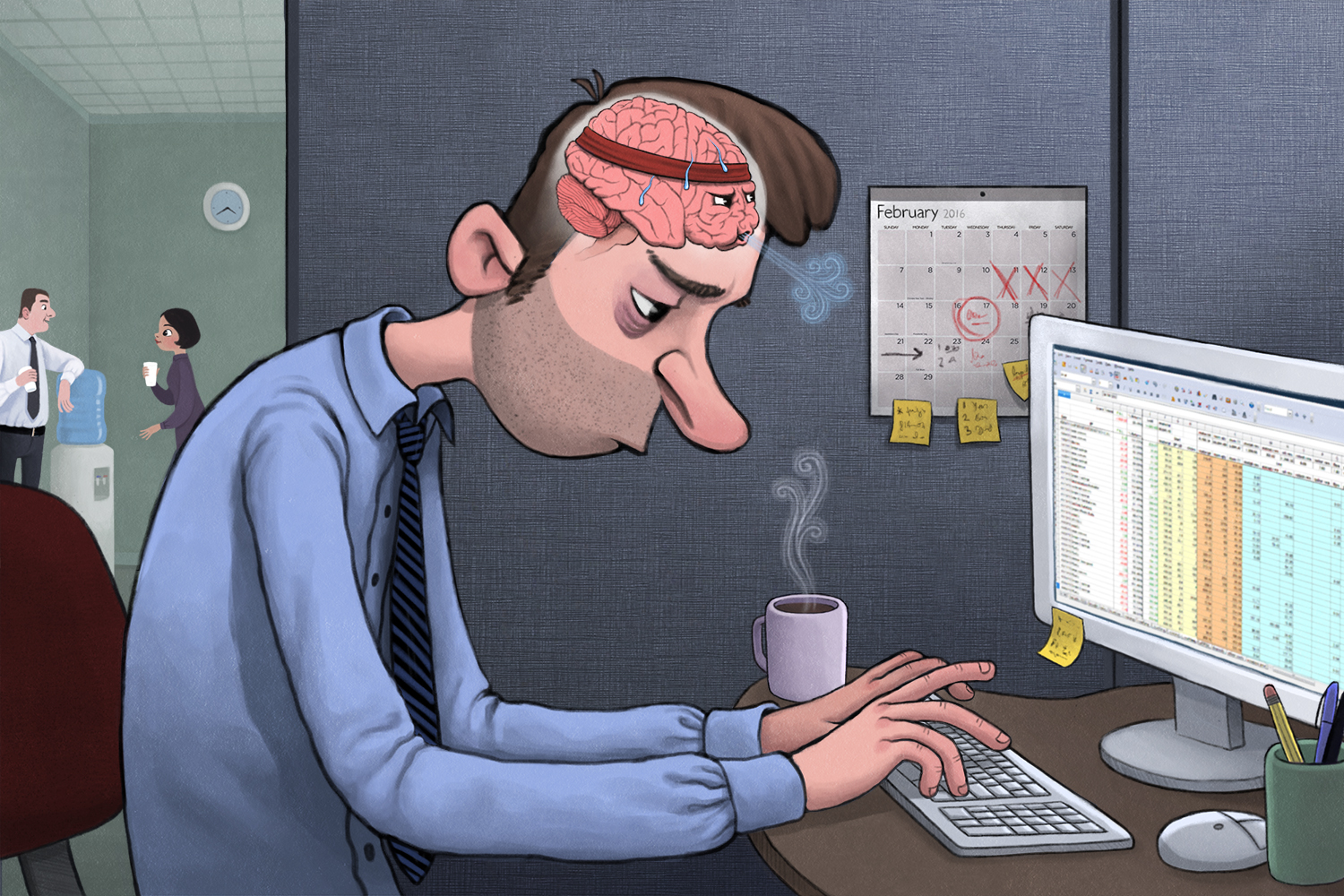Nowadays, a lot of people experience mental fatigue as a result of the increasing demands of modern life. Manual activity can wear you out physically, but what about demanding mental tasks? You can become as exhausted by thinking for hours as you would from running a marathon.
New information has been discovered by researchers that explains why thinking wears one out mentally. Additionally, they found that prolonged focus saps the brain’s capacity for decision-making. For instance, you might decide to eat a microwave supper rather than cook after a long day at work. Your mind automatically leans toward the simpler solution because you have a limited amount of energy.
The study published in Current Biology goes deeper into the reasons why people experience mental fatigue after periods of intense concentration.
Researchers discovered that the prefrontal cortex accumulates harmful wastes after several hours of demanding cognitive work. This buildup of toxins might impair your ability to make decisions, causing you to choose easy, low-cost behaviors.
According to Mathias Pessiglione of Pitié-Salpêtrière University in Paris, France, “influential theories indicated that exhaustion is a sort of illusion built up by the brain to make us stop whatever we are doing and turn to a more rewarding pastime.”
The accumulation of noxious compounds brought on by cognitive labor, according to our research, causes a true functional alteration. As a result, weariness would be a signal to cease working, but for a different reason: to protect the integrity of brain function.
Pessiglione and his associates sought to comprehend the causes underlying mental fatigue. The brain resembles a very complicated machine, yet unlike a machine, it cannot calculate indefinitely.
Therefore, scientists were interested in learning why the brain has a finite capacity for thought. They proposed that the brain’s constraints might be explained by the necessity to recycle potentially harmful consequences of neuronal activity.

What Causes Mental Exhaustion is Proven by Study
The team measured the chemistry of the brain throughout the workday using magnetic resonance spectroscopy (MRS), to support this theory. They looked at two different groups of people: those who had mentally taxing jobs and those who had relatively easy jobs.
The team only noticed overt indicators of fatigue, including dilated pupils, in the group performing demanding mental work. After finishing their work, members of that group likewise frequently sought out quick pleasure.
Additionally, the prefrontal cortex synapses in the brain displayed greater glutamate concentrations.
The authors conclude that this supports the notion that glutamate accumulation inhibits brain activity when taken together with earlier data.
In other words, after a mentally taxing workday, toxic chemicals in the brain make cognition more difficult and energy-intensive. Could these limitations on our cognitive powers be overcome in some way? Unfortunately, scientists think that the brain’s processing abilities are strictly limited—and for good reason. I’m afraid not, Pessiglione replied.”I would use tried-and-true methods like rest and sleep! There is strong proof that glutamate is removed from synapses as you sleep.
The authors also provided some suggestions for preventing mental fatigue. They think that keeping an eye on prefrontal metabolites may be able to spot cases of excessive cognitive exhaustion. Finding these poisons in the brain might motivate workers to take more frequent breaks, preventing burnout. Additionally, researchers advise against making important decisions when mentally fatigued.
The team plans to conduct additional research to determine why the prefrontal brain appears to be particularly susceptible to glutamate accumulation and mental fatigue. They also intend to investigate other studies on glutamate recovery levels during sleep or rest. Finally, they are curious to know if the same fatigue signals in the brain could enhance cancer or depression treatments.
Guidelines for Preventing or Reducing Mental Fatigue or Exhaustion
More people than ever before describe feeling burned out in this too stressful environment. According to a 2021 Indeed study, 52% of Americans reported feeling burned out, with millennials being the group most impacted (59%). So, what can we do to stop this growing mental fatigue? We’ll give you some advice on enhancing your mental endurance below.
1-Safeguard your energy. In today’s environment, several distractions compete for our attention. You don’t have endless energy, so be careful how you utilize it. When you experience the effects of mental tiredness, you are not required to consent to working longer hours or responding to text messages. By establishing clear limits with both yourself and others, reclaim your authority. Set a time limit for yourself to catch up with pals on social media, and then take a break from electronics. Especially in our “always on” society, our brains require rest.
2-Do not multitask. Do you know that our brains are incapable of multitasking? While multitasking may make us feel like we’re getting more done, the brain can only focus on one job at a time. As a result, multitasking makes us slower because it requires the brain to move between tasks quickly. According to research, attempting to multitask can result in a 40% productivity loss!
3-Decide what matters to you. It is clear that society as a whole struggle with overthinking. Technology, particularly smartphones, has probably contributed significantly to the epidemic of overthinking. Our brains have not developed to cope with the overabundance of inputs and stimulation in contemporary culture. Simplify your life as much as you can to reduce the number of ideas you have. There is less cognitive stress when the mind isn’t overworked, which many of us experience.
4-Meditate. According to studies, regular meditation alters the activity of the alpha wave, which helps with attention and distractibility. To prevent mental weariness, try meditating for at least fifteen to thirty minutes each day.
Final Words on Study Outlining the Roots of Mental Fatigue
What causes mental weariness was recently discovered by University of Paris experts. The research team discovered that prolonged, intensive mental effort causes the brain to produce harmful byproducts like glutamate. These poisons build up in the prefrontal cortex, which can impair judgment and result in cognitive decline.

No Comments
Leave Comment